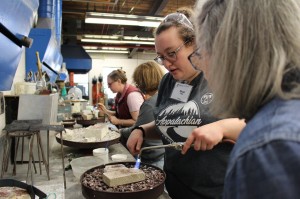Celeste Scott, Horticultural Agent, UT-TSU Extension Madison County
Tennessee gardeners often consider the common fig, Ficus carica, as not well suited to the majority of the state's growing conditions. While many common figs are indeed best grown in zones 8 to 10, several cultivars now possess cold hardiness and can be successfully grown in zones 7, 6 and even 5 when properly sited and managed. The term 'hardy' refers not only to the limbs' increased ability to sustain winter conditions, but more importantly to the roots' ability to survive cold temperatures.
Ficus carica cultivars 'Brown Turkey,' 'Improved Celeste,' and 'Hardy Chicago' are all touted for improved cold tolerance. In growing seasons following mild winters many cultivars, including those listed here, have the ability to produce two crops. The first crop, grown on previous year's wood, is referred to as the breba. This crop is usually smaller and less flavorful than the main crop, which matures later in the summer on current year's growth. In some cases, the breba may be the only crop that has adequate time to develop. In colder zones and exposed sites, it is common for the above ground plant parts to be injured and even killed to the ground by harsh winters, but two qualities in particular give these cold hardy cultivars a leg up. The cold hardiness of the roots ensures that the plant will survive, and their classification as a short-season producer (90 to 100 days to maturation) means that a crop can be produced on new wood the following season. These qualities provide an obvious advantage in colder climates with shorter growing seasons.
While proper cultivar selection is non-negotiable, proper siting also plays an important role. Placement near a south or southwest facing wall or structure can provide protection from harsh winter wind, give access to high light, and even provide radiant heat. These conditions come together to create an ideal micro-climate. Obviously, while not everyone will have this 'ideal fig paradise' in his or her landscape, we can still make figs work for you! If no structural protection is feasible, young plants can be caged and surrounded with straw, hay or leaves for added protection from fluctuating cold temperatures. A final option is to grow fig plants in very large containers and move the plants to a more protected area, like a garage, during the winter months.
'Brown Turkey' is one of the most common cultivars on the market and it's reliable. 'Improved Celeste' is from the breeding program at Louisiana State University and is often referred to as Sugar Fig because of its sweet flavor. It also has been noted for heat tolerance. 'Hardy Chicago' is likely the most cold tolerant with above-ground portions hardy down to 10 F and roots to 20 degrees below zero.
Contrary to popular belief, the fruits of common fig do not require internal pollination by a specialized wasp. The fruits of Ficus carica are parthenocarpic (fruit develops without fertilization) and therefore do not require multiple cultivars to set fruit. As fruits mature, look for three signs of ripeness: color change from green to brown or purple, softened fruit and hanging fruit. Figs are used in a variety of dishes, from sweet desserts to savory meat and cheese combos. For the staff of the UT Gardens, Jackson, a favorite pairing is fresh fig with goat or cream cheese on crackers or toast and drizzled with honey!
Ficus carica collections at UT Gardens, Jackson, include 'Giant Green Italian,' 'Pete's Honey,' 'LSU Purple,' 'Violet de Bordeaux,' 'Hardy Chicago,' and 'Celeste.' At the UT Gardens, Knoxville, you can see 'Brown Turkey,' 'Celeste,' 'Panache,' and an unnamed heirloom from George Washington's father-in-law's plantation in Virginia.
I hope that this brief plant profile provides some enlightenment and inspires you to try Ficus carica in your own landscape!
The UT Gardens includes plant collections located in Knoxville, Crossville and Jackson. Designated as the official botanical garden for the State of Tennessee, the collections are part of the UT Institute of Agriculture. The Gardens' mission is to foster appreciation, education and stewardship of plants through garden displays, educational programs and research trials. The Gardens are open during all seasons and free to the public. For more information, see the Gardens website: utia.tennessee.edu/state-botanical-garden.









